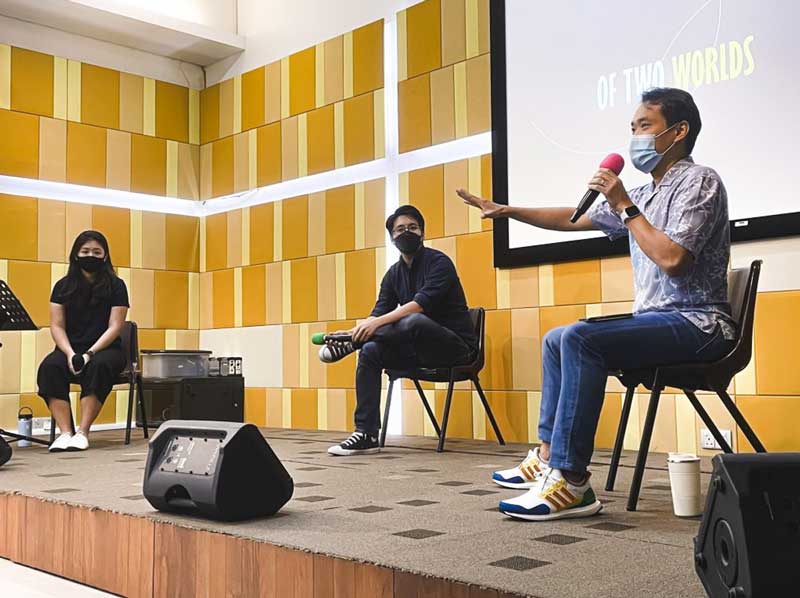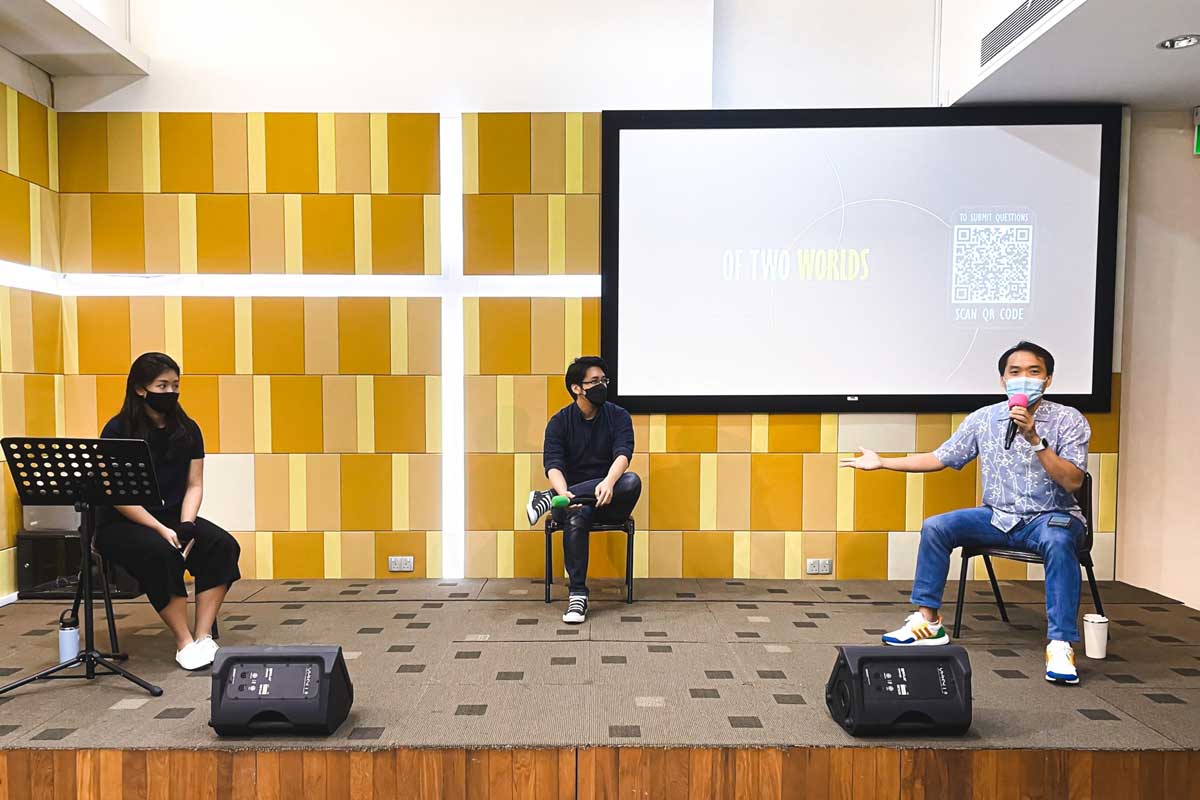On 14 Nov 2021, the fourth and final instalment of Of Two Worlds looked at lesser-known jobs, the ones that have no glam factor and involve little contact with the man on the street. But yet these jobs are an integral part of any modern economy. The two panellists were Dennis Leong, a security manager in a global payments technology company, and Kegan Ang, a planning engineer in the semiconductor industry.
In 2003, Dennis graduated with an engineering degree, and had plans to look for a job related to his degree, only to find that in an economic downturn, engineering jobs were few and far in between. A re-assessment of his interests and skillsets was necessary in order to secure a job.
“I was interested in technology, risk management and interacting with people, and found that corporate security work fit the bill,” Dennis, now in his 40s, recalled.
For Kegan, who is in early 30s, graduated with a degree in statistics. He decided to dabble in his interests that were vastly different from his degree, taking on freelance work in design and photography. He also applied for jobs in the social service and government sectors.
When all those doors remained firmly shut, he decided it was time to ask someone to help him look for a job – “I resolved to take up whatever job that came my way.”
The day after that, a senior leader at church approached him and asked if he was looking for a job. “The timing was just too perfect – It had to be from God,” Kegan thought.
In the week that followed, he was asked to attend three interviews, and by the end of that week, he was offered a job in the corporate world.
Reviewing early ambitions
It’s never a nice feeling when you get rejected, and it was no different for Dennis.
“I remember feeling the sting of rejection from prospective employers. It shook my self-confidence. But on further reflection, I knew I had done my best preparing for the interviews and presenting myself. I felt at peace, recognising that God had seen me through the interviews, and was still journeying with me.”
Kegan recalled his initial aversion to the corporate world.
“I kept wanting to leave, but God said no. I argued with God a lot,” he admitted.
After many arguments, he finally realised that his desire to work in the social service sector was based on his assumption that it was easier to share about God there. But God told him he could not move until he learned to share the gospel where he was placed.
As he eased into his workplace, he desired the managerial track. Yet, the work he was given geared him up for the technical track. Once again, he argued against his lot. God reminded him of the purpose of work – “You are there to help people. Do what the people need you to do.”
With that newfound clarity, Kegan left the decision on his placement with his bosses. He was at peace, knowing that their decision would benefit the company.

Motivation in the midst of mundanity
Both panellists agreed that finding purpose in their everyday work, no matter how mundane, was crucial.
In security work, the core mission is safety, and Dennis sees value in supervising his team well, because the outcome protects others.
Kegan at first struggled to find a noble cause for his work. In fact, he felt guilty fuelling consumerism.
“The semiconductor industry produces more microchips so that the companies can release more new products – and get people to spend more money on their tech devices every year!”
After grappling with that for a long time, he eventually saw God’s purpose for him. “I don’t have to help the entire world. As an individual, I can impact the lives of the people I work with every day.”
When work gets mundane, he reminds himself that he needs to continue to do his part for his team. In that way, his teammates experience less frustrations, they return home happier, and can have a better life.
Loving Outreach at the workplace
Loving outreach for both involves living out their faith, consistently demonstrating principles such as care, compassion and integrity.
In Dennis’ first job as an auxiliary police officer, he worked at establishing trust with those under his charge. Among them was a middle-aged colleague who one day confided in him about his gambling addiction. Dennis took the opportunity to share with him about God. His colleague took a leap of faith to seek God’s help, and eventually came to Christ.
Sharing the faith is harder during this pandemic, so Dennis has done little things like surprising his colleagues with simple Christmas gifts. He says, “I am careful not to push Christianity. I do however, make it clear I’m a believer, and that I care for them.”
For Kegan, he spends so much time in church that everyone knows he is a Christian. He has not yet learnt how to speak openly about God, so he makes extra effort to uphold Christ’s values through action, which has not gone unnoticed.
Once, a colleague from another department scolded him, and accused his team of underperforming. He was taken aback as he hardly knew her nor the context she was referring to. He was about to give her a piece of his mind when a little voice stopped him: “Just be nice to her and let it play out. You want to see how I can work in your work place? Then do it the nice way.”
He swallowed his impulse and made time to understand her problem, then he involved his teammates and boss in problem-solving discussions. By the day’s end, her tone had softened and she thanked him for listening and solving the issue when no one else would give her the time of day.
This incident reinforced the mission that he felt God had given him – to make other’s lives better.
Figuring out the road ahead
The world presents a romanticised image of what one’s destiny should be, Kegan cautioned. What God desires of us is to not be so fixated on the future and final destination, that we forget to walk with Him today. Instead of destiny, he proposes looking at life in seasons.
In the workforce, seasons can be marked by our roles, colleagues, and the organisation. “Even retirement is a season that God can use. We need to be in conversation with God about what is going on in our lives, and listen to what He has to say about it,” said Kegan.
“Recognise that through the seasons, God is always in full control,” Dennis added. “What we do matters less than how we do things. And for that, we just need to trust God who holds our hand.”
Read the other articles in the Of Two Worlds seminar series >


